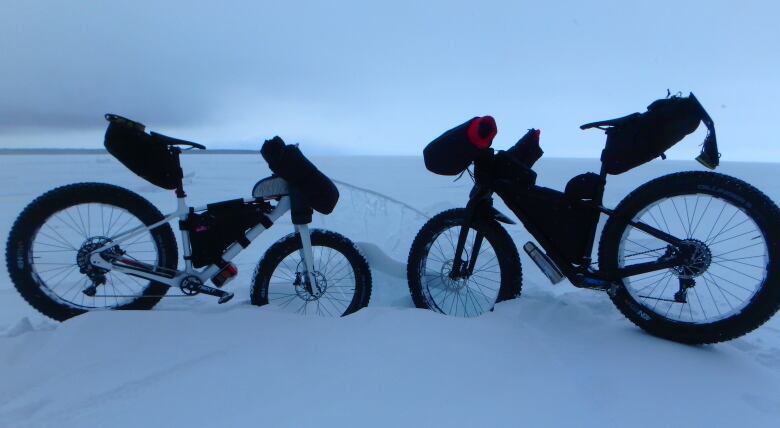Lake Winnipeg a 'perfect' place to train for South Pole cycling trip
Manitoba lake resembles frigid conditions riders likely to face on South Pole expedition
A brave group of cyclistsispeddalling out onto the icy surface of Manitoba's largest lake to ride theburliestbikes on the market through blistering winds and blowing snow, all in preparation for a trip across the South Pole.
The ride will serve as atraining session designedto introduce the winter cyclists to some of the harshest riding conditions on the planet before they head on theworld's first fat bike expedition to the South Pole next winter, dubbed "The Last Degree."
"The concept of this is basically to bring people out in the winter time and give them the skills necessary to thrive multiple days in a row," trip leader BenShillingtonsays.

After spending a day indoors overnight, the cyclistsventured out tolearn how toset up and take down a tent on the ice.Each cyclist will carry a shovel, tent, camp stove, food and other items on them for the extent of the training and South Pole trip.
"They're going to get an opportunity to ride around fully loaded, and see what it's like to layer those clothes and how warm you actually are once you start cycling," Shillington says.
Staying alive
Whilethe focus of the big trip next winter isultimately about having fun riding bikes in a new environment, there isalso the rather serious challengeof keepingwarm, well-fed andhydrated throughout.
"The temperatures there, in the travelling season for Antarctica, getdown to 35 C, 40 C, and then you can throw some windchill on that and that's why Lake Winnipeg lends itself well," Shillington says.
But those are just worst-case scenarios.
In the dead of winter, CBC meteorologist John Sauder saysaverage overnight lows on Lake Winnipegare in the 26 C range. In the South Pole, he says December through February (summertime or "travelling season"in Antarctica)seethe mercury dropto29.6 C on average at night, assuming there's no wind chill.

Out on Lake Winnipeg Thursday, cyclists were given a crash course on how to change flat tires fast and efficiently without losing fingers to frostbite;how to start and keep a camp fire lit in the middle of a frozendesert landscape.
Organizers put participants through a "systems check" routine, going over packing lists to ensure they all had the appropriate specialized equipment necessary to stay alive in the middle ofthe South Pole or Lake Winnipeg, which Shillington callsa "model" simulation environment.
'Pretty perfect simulation' on Lake Winnipeg
Organizers also chose Lake Winnipeg to be the site of the training course because it's easy to access and shares a few uncanny similarities withAntarctica.
"You can get to a point where there's no visual land reference,"Shillington said, adding cyclists will cover between 110 and 120 kilometres of snowy territory in 18 days on their South Pole trip.
"[You]get basically a pretty perfect simulation of what we'd be encountering down there."
Shillington isn't a complete stranger to Lake Winnipeg. He trekked along the north basin through a cold snap a few years ago and is hoping for similarly harsh conditions for his clients.
"That was just really good preparation and that's what I want to re-simulate again with our clients so they know what to expect," he said.

The course is mandatory for everyone signed up to go on the South Pole expedition. Shillington said it was important participants get a positive experience on a landscape like Lake Winnipeg under their belt before heading south.
But, he says, the training session could also give riders pause and a chance to duck out of the big expedition before it'stoo late.
"You want to make sure people don't sign up for something that they don't understand they're getting themselves into," he said.
In the end, thefat bike South Poletrip and Lake Winnipeg training session are abouthaving a good time, facing a new challengeand staying active outdoors year round, Shillingtonadded.
"It's essentially a new way to go explore."













_(720p).jpg)


 OFFICIAL HD MUSIC VIDEO.jpg)
.jpg)



























































































